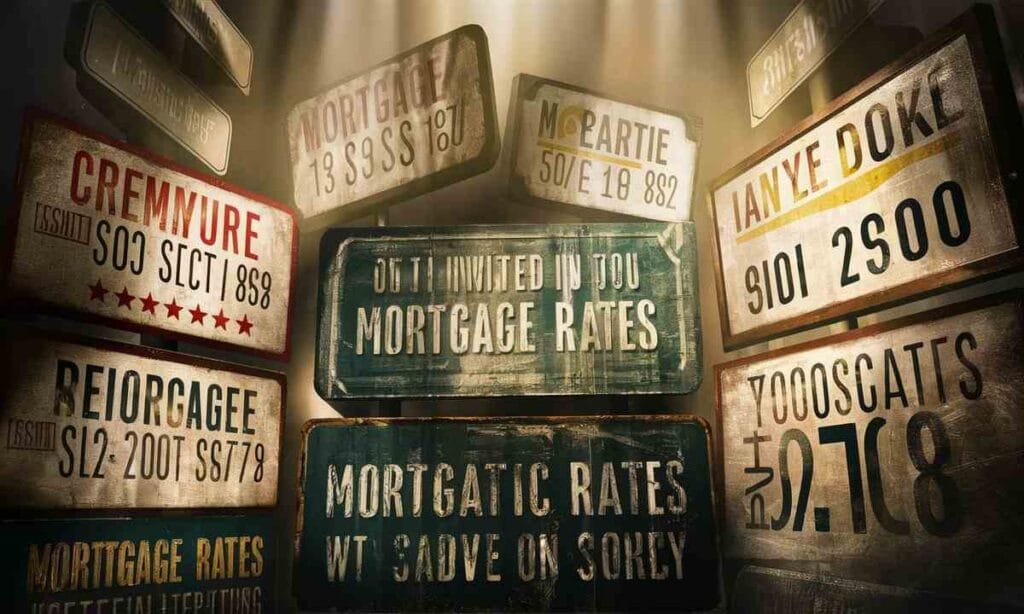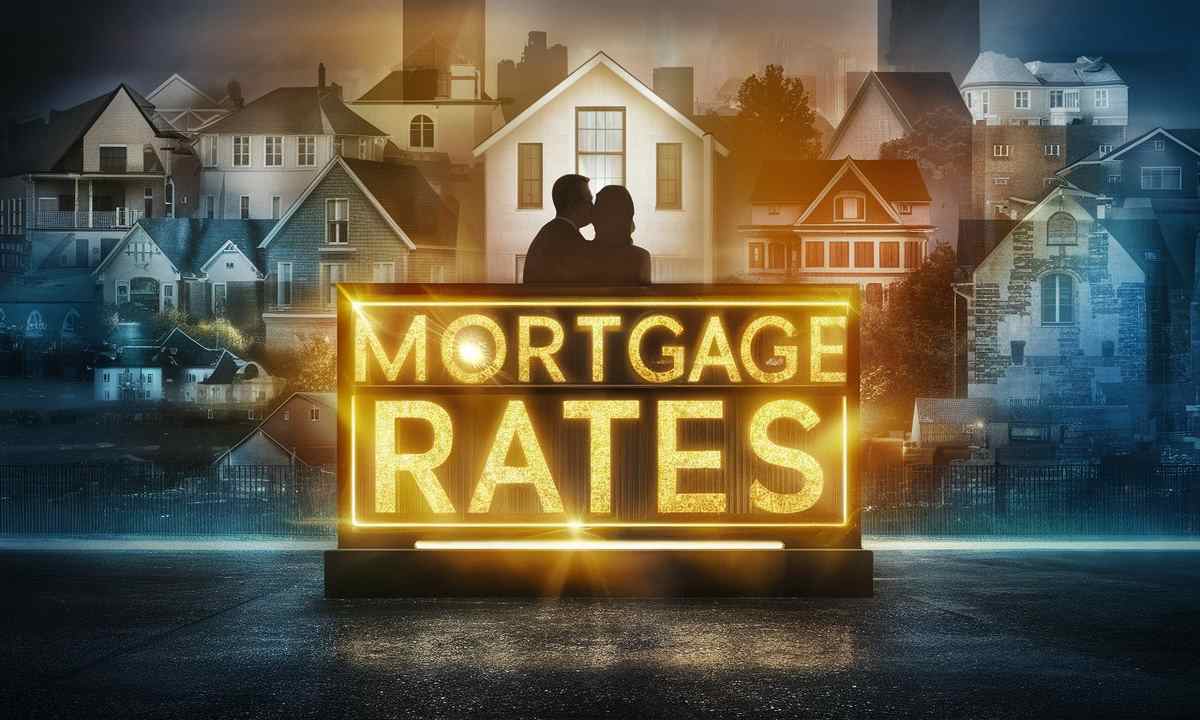Understanding Mortgage Rates
Mortgage rates are the interest rates charged by lenders on home loans. They represent the cost of borrowing money to purchase a home and play a crucial role in determining your overall mortgage expense. Understanding mortgage rates involves recognizing how they influence both your monthly payments and the total cost of the loan over time.

Why Knowing Mortgage Rates Matters
Awareness of mortgage rates is vital for making informed financial decisions. Rates impact not just the affordability of your monthly payments but also the long-term financial implications of your home loan. Knowing how mortgage rates work can help you choose the best time to buy, refinance, or negotiate your mortgage terms.
Basics of Mortgage Rates
Defining Mortgage Rates
Mortgage rates are expressed as an annual percentage of the loan amount. They reflect the cost of borrowing and vary based on the type of mortgage, the lender, and the borrower’s financial profile. Mortgage rates are typically quoted as an annual percentage rate (APR), which includes both the interest rate and any associated fees.
How Mortgage Rates Are Calculated
Mortgage rates are calculated based on several factors, including the prevailing economic conditions, the borrower’s creditworthiness, and the type of mortgage. Lenders use these factors to determine the risk associated with lending money, which in turn influences the rate they charge. The calculation of mortgage rates involves a blend of market-driven factors and individual borrower criteria.

Types of Mortgage Rates
Fixed-Rate Mortgages
Fixed-rate mortgages have an interest rate that remains constant throughout the life of the loan. This provides predictability in monthly payments and long-term stability. Fixed-rate mortgages are ideal for borrowers who prefer a stable payment structure and plan to stay in their homes for an extended period.
Adjustable-Rate Mortgages
Adjustable-rate mortgages (ARMs) have interest rates that can fluctuate over time based on market conditions. ARMs typically start with a lower initial rate compared to fixed-rate mortgages but can increase or decrease periodically. They are suitable for borrowers who anticipate changes in their financial situation or plan to move before the rate adjusts significantly.
Hybrid Mortgages
Hybrid mortgages combine features of both fixed-rate and adjustable-rate mortgages. They offer a fixed interest rate for an initial period, after which the rate adjusts periodically based on market conditions. This type of mortgage provides initial rate stability with the potential for adjustments in the future.
Factors Influencing Mortgage Rates
Economic Indicators
Economic indicators such as GDP growth, unemployment rates, and consumer confidence influence mortgage rates. Lenders and investors use these indicators to gauge the overall health of the economy, which impacts interest rate trends.
Inflation and Interest Rates
Inflation affects mortgage rates by influencing the cost of borrowing. As inflation rises, lenders may increase rates to maintain their profit margins. Conversely, lower inflation can lead to lower mortgage rates. Interest rates set by central banks also play a significant role in determining mortgage rates.
Central Bank Policies
Central banks, such as the Federal Reserve, influence mortgage rates through their monetary policy decisions. Changes in the federal funds rate or other central bank policies can affect the cost of borrowing and, consequently, mortgage rates. Understanding these policies helps borrowers anticipate rate changes and plan accordingly.
Credit Scores and Their Impact
A borrower’s credit score is a critical factor in determining mortgage rates. Higher credit scores generally qualify for lower rates, as they represent lower risk to lenders. Improving your credit score can lead to more favorable mortgage terms and lower borrowing costs.
Loan Terms and Amounts
The terms and amount of the loan also impact mortgage rates. Longer loan terms may come with higher rates due to the increased risk to the lender over time. Conversely, shorter loan terms often have lower rates but higher monthly payments. The size of the loan can also affect the rate, with larger loans sometimes attracting higher rates.

How Mortgage Rates Affect Home Loans
Impact on Monthly Payments
Mortgage rates directly influence the amount of your monthly payment. Higher rates result in larger payments, while lower rates reduce the amount you pay each month. Understanding this relationship helps in budgeting and financial planning.
Effect on Total Loan Cost
The total cost of a mortgage is significantly affected by the interest rate. Over the life of the loan, higher rates can lead to substantially more interest paid. Calculating the total cost of the loan helps borrowers assess the long-term financial impact of different mortgage rates.
Adjustments Over Time
For adjustable-rate mortgages, the interest rate can change periodically, affecting the amount of monthly payments. Understanding how and when these adjustments occur helps borrowers manage their finances and plan for future changes in payment amounts.
Current Trends in Mortgage Rates
Recent Historical Trends
Analyzing recent historical trends in mortgage rates provides insight into how rates have moved over time. This information helps borrowers understand past fluctuations and anticipate future trends based on historical data.
Predicted Future Trends
Forecasting future trends in mortgage rates involves examining economic indicators, central bank policies, and market conditions. Predictions about rate changes can help borrowers make informed decisions about timing their mortgage application or refinancing.
How to Find the Best Mortgage Rates
Comparing Lenders and Offers
Shopping around and comparing offers from different lenders is crucial for finding the best mortgage rates. Different lenders may provide varying rates and terms, so it’s essential to evaluate multiple options before making a decision.
Utilizing Online Tools and Calculators
Online tools and calculators can help estimate mortgage rates and compare different loan scenarios. These resources provide valuable insights into potential costs and help borrowers make data-driven decisions.
Negotiating Your Rate
Negotiating with lenders can lead to better mortgage rates. Understanding the factors that influence rates and being prepared to discuss them with lenders can help secure more favorable terms.
Mortgage Rates and Your Credit Score
How Credit Scores Influence Rates
Credit scores have a direct impact on mortgage rates. Higher credit scores typically qualify for lower rates, while lower scores may result in higher rates. Understanding this relationship helps borrowers work towards improving their credit scores to obtain better rates.
Improving Your Credit Score for Better Rates
Improving your credit score involves managing debt, making timely payments, and correcting any inaccuracies on your credit report. A higher credit score can lead to more favorable mortgage rates and lower overall borrowing costs.
Understanding APR vs. Interest Rate
What APR Includes
The Annual Percentage Rate (APR) includes the interest rate plus any additional fees and costs associated with the loan. It provides a more comprehensive view of the total cost of borrowing, including both interest and fees.
How APR Differs from the Interest Rate
While the interest rate represents the cost of borrowing money, APR includes both the interest rate and additional costs. Understanding the difference between APR and the interest rate helps borrowers compare loan offers more accurately.
Fixed vs. Adjustable-Rate Mortgages
Pros and Cons of Fixed-Rate Mortgages
Fixed-rate mortgages offer stability with consistent monthly payments, making budgeting easier. However, they may come with higher initial rates compared to adjustable-rate mortgages. Fixed-rate mortgages are ideal for those who prefer long-term predictability.
Pros and Cons of Adjustable-Rate Mortgages
Adjustable-rate mortgages (ARMs) typically start with lower initial rates but can fluctuate over time. They may offer lower initial payments but come with the risk of rate increases. ARMs are suitable for borrowers who anticipate changes in their financial situation or plan to move before significant rate adjustments.
The Role of the Federal Reserve
Impact of Federal Reserve Decisions on Mortgage Rates
The Federal Reserve influences mortgage rates through its monetary policy decisions. Changes in the federal funds rate or other central bank actions can affect borrowing costs and mortgage rates. Understanding these impacts helps borrowers anticipate and respond to rate changes.
Understanding Federal Reserve Announcements
Federal Reserve announcements provide insights into future monetary policy and its potential effects on mortgage rates. Keeping abreast of these announcements helps borrowers make informed decisions about their mortgages.
Refinancing and Mortgage Rates
When to Consider Refinancing
Refinancing can be beneficial if current mortgage rates are lower than your existing rate, or if you wish to change the loan term or structure. Evaluating the potential savings and costs associated with refinancing helps determine if it’s the right move.
How Refinancing Affects Your Rate
Refinancing involves obtaining a new mortgage to replace the existing one, potentially at a lower rate. This can lead to reduced monthly payments and overall borrowing costs. Understanding the effects of refinancing helps in making strategic decisions about your mortgage.
Common Myths About Mortgage Rates
Debunking Mortgage Rate Myths
Common myths about mortgage rates, such as fixed rates always being better than adjustable rates or that rates can’t be negotiated, can lead to misconceptions. Addressing these myths helps in making more informed mortgage decisions.
Understanding the Truth Behind Common Misconceptions
Clarifying misconceptions about mortgage rates, such as the impact of economic conditions or credit scores, provides a more accurate understanding of how rates work. This knowledge aids in navigating the mortgage process effectively.
Strategies for Locking in a Mortgage Rate
What It Means to Lock in a Rate
Locking in a mortgage rate involves securing a specific rate for a set period before finalizing the loan. This protects against rate fluctuations during the loan approval process.
How to Lock in a Rate Successfully
To lock in a rate successfully, work with your lender to understand the terms and conditions of the lock. Ensure that you meet any deadlines and conditions to maintain the locked rate until your loan closes.
The Impact of Market Conditions on Mortgage Rates
How Economic Conditions Affect Rates
Economic conditions such as inflation, employment rates, and overall economic growth influence mortgage rates. Understanding these conditions helps in predicting rate movements and making informed decisions.
Market Trends and Mortgage Rate Fluctuations
Market trends, including changes in housing demand and investor behavior, can impact mortgage rate fluctuations. Monitoring these trends provides insights into potential rate changes and helps borrowers plan accordingly.
Special Mortgage Rates and Programs
First-Time Homebuyer Programs
First-time homebuyer programs often offer special mortgage rates and incentives to help new buyers enter the market. Exploring these programs can
provide opportunities for more favorable loan terms.
Government-Backed Loans
Government-backed loans, such as FHA, VA, and USDA loans, offer specific benefits and often come with competitive rates. Understanding these options helps in finding suitable mortgage solutions.
Special Interest Rate Offers
Occasionally, lenders may offer special interest rates or promotions. Keeping an eye on these offers can provide opportunities for lower rates and better loan terms.
How to Monitor and Manage Your Mortgage Rate
Keeping Track of Market Changes
Regularly monitoring market changes and interest rate trends helps in managing your mortgage effectively. Staying informed about economic conditions and rate movements allows for timely adjustments to your mortgage strategy.
Adjusting Your Strategy Based on Rate Movements
Adapting your mortgage strategy based on rate movements involves considering refinancing or adjusting loan terms in response to changing rates. Flexibility in your approach helps optimize mortgage costs and financial planning.
Long-Term Considerations
Planning for Future Rate Changes
Planning for future rate changes involves anticipating how economic conditions and central bank policies may impact mortgage rates. Strategic planning helps in managing long-term mortgage costs effectively.
Impact on Long-Term Financial Goals
Mortgage rates have a significant impact on long-term financial goals, including retirement planning and wealth accumulation. Understanding this impact helps in aligning mortgage decisions with overall financial objectives.
Summary and Key Takeaways
Recap of Key Points on Mortgage Rates
Summarizing the key points about mortgage rates provides a concise overview of their impact, types, and factors influencing them. This recap helps in reinforcing the most important aspects of mortgage rates.
Final Thoughts on Managing Mortgage Rates
Effective management of mortgage rates involves staying informed, understanding the impact of rates on your financial situation, and making strategic decisions. Applying these insights helps in achieving optimal mortgage outcomes and financial stability.
Frequently Asked Questions (FAQs)
How do mortgage rates affect monthly payments?
Mortgage rates directly impact your monthly mortgage payments. Higher rates lead to increased payments, while lower rates reduce them. The rate determines the amount of interest paid over the life of the loan, thus influencing the affordability of your monthly payments.
What factors influence mortgage rates?
Several factors influence mortgage rates, including economic indicators, inflation, central bank policies, and individual credit scores. Market conditions and the borrower’s financial profile also play significant roles in determining the rate.
How can I get the best mortgage rates?
To secure the best mortgage rates, compare offers from multiple lenders, utilize online rate comparison tools, and negotiate your rate. Additionally, maintaining a high credit score and shopping around at different times can help you find favorable rates. Source
What is the current average mortgage rate?
The current average mortgage rate fluctuates based on market conditions. As of recent data, the average 30-year fixed mortgage rate is around 6.50%. For the most up-to-date rates, consult financial news sources or mortgage lenders.
How often do mortgage rates change?
Mortgage rates can change frequently, often daily or even multiple times a day, depending on market conditions and economic factors. Lenders adjust rates based on shifts in the financial markets and economic data.
What is the difference between fixed and adjustable mortgage rates?
Fixed-rate mortgages have an interest rate that remains constant throughout the life of the loan, providing predictable monthly payments. Adjustable-rate mortgages (ARMs) have rates that fluctuate periodically based on market conditions, which can lead to varying payment amounts over time.
How can I lock in a mortgage rate?
To lock in a mortgage rate, work with your lender to secure a specific rate for a set period before closing on the loan. Ensure you understand the terms of the lock-in agreement and any deadlines to protect the agreed rate.
What is the impact of my credit score on mortgage rates?
Your credit score significantly impacts your mortgage rate. Higher credit scores generally qualify for lower rates, as they represent lower risk to lenders. Improving your credit score can help secure a more favorable mortgage rate.
Should I refinance my mortgage to get a better rate?
Refinancing can be beneficial if current mortgage rates are lower than your existing rate or if you wish to alter the loan term. Evaluate the potential savings and costs associated with refinancing to determine if it is advantageous for you.
How do mortgage rates vary by lender?
Mortgage rates can vary by lender based on their own pricing strategies, overhead costs, and risk assessments. Comparing rates from multiple lenders helps you find the most competitive offer for your mortgage.
What are points in mortgage rates and how do they work?
Points are upfront fees paid to the lender to lower the interest rate on a mortgage. Each point typically costs 1% of the loan amount and can reduce the interest rate by about 0.25%. This can lead to lower monthly payments and overall interest costs.
How do economic conditions affect mortgage rates?
Economic conditions, such as inflation, employment rates, and economic growth, affect mortgage rates. Strong economic growth and high inflation can lead to higher rates, while economic downturns may result in lower rates.
Can mortgage rates be negotiated?
Yes, mortgage rates can be negotiated. By comparing offers, understanding market conditions, and discussing your financial profile with lenders, you may be able to negotiate a lower rate. Source
What is the difference between APR and interest rate in a mortgage?
The interest rate is the cost of borrowing money, expressed as a percentage of the loan amount. The Annual Percentage Rate (APR) includes the interest rate plus any additional fees or costs associated with the loan, providing a more comprehensive view of the total borrowing cost.
How do mortgage rates affect home buying decisions?
Mortgage rates impact home buying decisions by influencing the affordability of monthly payments and the total cost of the loan. Lower rates can make home buying more affordable, while higher rates may limit purchasing power or increase overall loan costs.
Are there special mortgage rates for first-time homebuyers?
Yes, first-time homebuyers often have access to special mortgage rates and programs, including government-backed loans and incentives designed to make homeownership more accessible. These programs can offer lower rates or reduced fees.
What are the best times to apply for a mortgage to get a lower rate?
The best times to apply for a mortgage to get a lower rate are typically when economic conditions are favorable and interest rates are low. Monitoring market trends and consulting with lenders can help you identify optimal times for applying.
How does the Federal Reserve impact mortgage rates?
The Federal Reserve influences mortgage rates through its monetary policy decisions, such as adjusting the federal funds rate. Changes in the federal funds rate can affect the cost of borrowing and, consequently, mortgage rates.
What should I do if I think my mortgage rate is too high?
If you believe your mortgage rate is too high, consider refinancing to obtain a better rate. Evaluate your current rate against market rates, and consult with lenders to explore refinancing options and potential savings.









